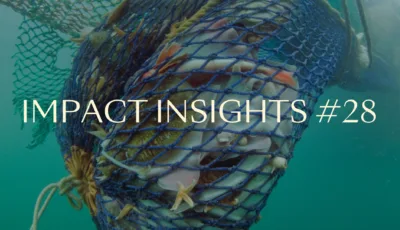Impact Insights #10
Wrapping up COP28, dive into this month's snapshot revealing the pivotal takeaways shaping our global climate action agenda.
Curated by our Sustainability Specialist, Kenza Akallal
■ COP28 wrapped
The first global stocktake ahead of COP revealed a shortfall in meeting Paris 2015 goals. COP28 in Dubai ended today with a historic deal that for the first time committed the world to a transition away from all fossil fuels. The final agreement calls for a transition of energy systems away from fossil fuels in “a just, orderly and equitable manner”, while concerns linger over its narrow focus on the energy systems. The IEA warns pledges made by countries would not be nearly enough to limit global warming to 1.5C. The deal also commits countries to triple the deployment of renewable power and double the rate of efficiency gains by 2030. McKinsey research published previously suggests that by 2030 the addressable market for electric power could be USD 1.5 trillion, a figure which could be even larger after this announcement. Several additional announcements and initiatives have provided a signal of intent on the critical role of climate technologies. And from some of the final remarks: “An agreement is only as good as its implementation.”
■ The world's war on greenhouse gas emissions has a military blind spot
Scientists and environmental groups are stepping up pressure on the UN to force armies to disclose all their emissions and end a long-standing exemption that has kept some of their impact off the books. Defense forces are not bound by international climate agreements to report or cut their GHG emissions, have been left out of the 1997 Kyoto Protocol on reducing GHG emissions and exempted again from the 2015 Paris accords. During COP28, the UN unveiled the Declaration on Climate, Relief, Recovery, and Peace, largely centered around fragile, conflict-affected communities or those in the midst of humanitarian crises. But it does not directly address rising military or conflict-related emissions either. Quoting William Wilberforce, “you may choose to look the other way but you can never say again that you did not know”.
■ Achieving SDG 2 without breaching the 1.5C threshold
For the first time ever, the UN FAO has published a global food systems’ road map to 1.5C, outlining 10 priority areas that demand mobilized finance without a delay. While “healthy diets” by default will reduce methane, that won’t be enough and will require producing more efficiently. The FAO has offered a range of proposals for increasing the productivity of agriculture production, from better feed to genetics. For the first time, agriculture has been a major focus at COP, and new money pledged for the global food system’s climate fight topped USD 7 billion during the summit.
■ Breaking the wrong records
The tragic death of 23-year-old Ana Clara Benevides at a Taylor Swift concert in Rio de Janeiro underscored the historical and dangerously hot conditions in Brazil, with the local temperature surpassing 48 degrees Celsius. What has received less attention is that that day also marked a global milestone. On November 17, the average surface temperature on Earth briefly exceeded 2C above pre-industrial levels, entering a new, critical phase of climate change as Earth heads for the warmest year on record in 2023. Chances of keeping within the 1.5C threshold put at a low 14 percent, with a world most likely on track to hit 2.9C as GHG emissions keep rising, according to the UN.
■ Apocalypse later, adaptation now
Climate adaptation needs a rebrand. People often associate it with infrastructure like sea walls, and it covers much more. The adaptation finance gap is growing. Investors often write off adaptation as a problem confined to policy and infrastructure. But it is also an opportunity to invent, reinvent, and deploy new technology on a significant scale, and most adaptive climate tech solutions are intertwined with mitigating climate change. "If decarbonization is the new industrialization, adaptation is the new modernization." If this setup piques your interest, check out the deep dive here.
■ We shouldn’t always need a business case to do the right thing
Digging out an older yet pertinent article from Harvard Business Review highlighting that our obsession with making the business case for ethics makes us sound apologetic and hollow. After all, there is also a business case for tax avoidance, deregulation, and even higher death rates. Using integrity as an inspirational narrative can be far more compelling. It calls for businesses to take a leadership role in tackling global challenges and emphasizes the impact of reputation and personal legacy on shaping a better world. Meanwhile, the recent Bain Visionary CEO’s guide to sustainability reveals that 75 percent of executives surveyed believe they have not effectively embedded sustainability into their businesses. One of the key questions for every CEO navigating a changing world starts with “What good do we bring to the world, and what is our purpose as a company?”.


